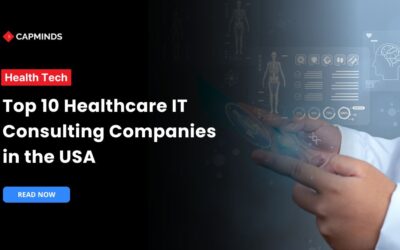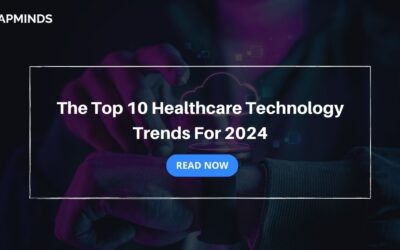2025 Healthcare Trends You Need to Know
Healthcare is a dynamic industry, and the only way to save more lives is to find better treatment methods. The demand for innovation is always there, as it will lead to more positive outcomes, faster treatment disbursal, higher recovery rates, lower costs, and so on.
Healthcare has significantly evolved in recent years, driving substantial technological advancements and creating countless opportunities.
As we enter 2025, personalized medicine, remote care, next-gen wearable tech, and AI advancements will completely reshape the healthcare industry. In this blog post, we have shared the most important and impactful trends in healthcare this year.
Healthcare Trends 2025
1. The Rise of Personalized Medicine
- In 2025, healthcare will be more focused on precision medicine.
- Healthcare practices are increasingly using AI and data to provide customized care to fit each patient’s individual needs.
- Tailored wellness plans and initiatives are designed to encourage hard-to-reach populations to connect with healthcare professionals.
- Providing personalized treatment to each patient will dramatically improve their experience, satisfaction, and preventative actions.
- This would lessen the societal burden imposed by rising healthcare expenses while also improving patient outcomes.
Related: 5 Powerful Ways Telehealth is Transforming Substance Use Disorder Treatment
2. Building Resilient Healthcare Systems
- Artificial intelligence will continue to expand in the healthcare industry.
- As AI advances, it will revolutionize the way healthcare systems plan for and respond to industry-wide concerns.
- This includes future pandemics as well as health problems brought on by war, starvation, and climate change.
- Decision Makers will gain comprehensive data and tools at their fingertips which is essential to understand the global trends impacting human health.
- This will include addressing the needs of aging populations in industrialized countries and the rising healthcare demands of developing countries.
3. Innovative Technologies in Mental Health Care
- Teletherapy is the advent of the newest technology that takes mental health services into a revolution.
- This comprises a variety of human therapy in which mental sessions could be convened virtually in VR or AR by the human therapist.
- They are also considering large-scale use of instant chatbots for 24/7 available support.
- The face of mental healthcare provision comes with lots of other issues such as the availability of resources and the stigma of seeking a helping hand for psychological conditions.
- As services increasingly open up, technological advancements within this field will facilitate greater access and timely intervention.
Related: Tracking & Analyzing Treatment Efficacy With Custom OpenEMR Mental Health Tools
4. Next-Gen Wearable Tech: Implants and Brain Interfaces
- This new age of high-tech carryable health will be marked by implantable devices like brain-computer interfacing.
- You might not immediately begin placing mini-chips into the recesses of your cerebral cortex but certainly expect a growing discussion, excitement, and buzz about this in 2025.
- From chronic pain management to paralysis, the technology is proving to hold Promise for some of its many health riddles that affect the lives of millions.
- However, this technology also poses many ethical questions: Who, for example, owns the data generated by our brains?
5. Unlocking the Potential of Genomics
- Genomics and gene editing are among the most thrilling yet ethically complex frontiers of innovation within the sciences.
- With technologies like CRISPR making ever-increasing steps from the laboratory into real-world clinical application, many hitherto thought incurable genetic conditions such as cystic fibrosis, Huntington’s disease, and muscular dystrophy are opening new targeted treatments.
- By 2025, ongoing investigations will be conducted into its implications for cancer and cardiovascular disease since this breakthrough technology makes it possible to treat such potentially life-threatening conditions at a molecular level.
6. Navigating the Health Data Privacy Challenge
- The explosion in volumes of health data, ranging from medical records to genomic data and information from wearables, has been the harbinger of rapid advancement in the science of healthcare.
- Unfortunately, this is a double-edged sword; the more people, organizations, and agencies we allow access to our most prized and sensitive data, the greater the potential risk of theft or misuse.
- The amount of health data makes it massively appealing to cybercriminals, and several problems could arise from it getting into the wrong hands-from identity theft occurring today to issues yet to be anticipated tomorrow.
- Only the financial risks would motivate the healthcare industry to act—according to the WEF, the sector that suffers most heavily from the effects of data breaches, with the average breach costing almost $11 million.
- Thus, by 2025, the healthcare industry will make developing strategies to secure information and protect society from this impending threat a critical priority.
7. Addressing the Healthcare Technology Skills Gap
- Instead, all this indeed can be destructively buzz-killed even if it realizes game-changing, AI-driven precision-target diagnoses and drug discovery due to the shortage of skilled personnel.
- For example, a recent survey regarding the challenges of digital transformation in healthcare found skills and talent shortages to be the largest barriers to benefiting from new technologies.
- We expect health industries and providers to invest in training, reskilling, and collaborations with the tech sector by 2025 to overcome this issue.
- This is vital for realizing all those useful promises of AI and biotechnology.




